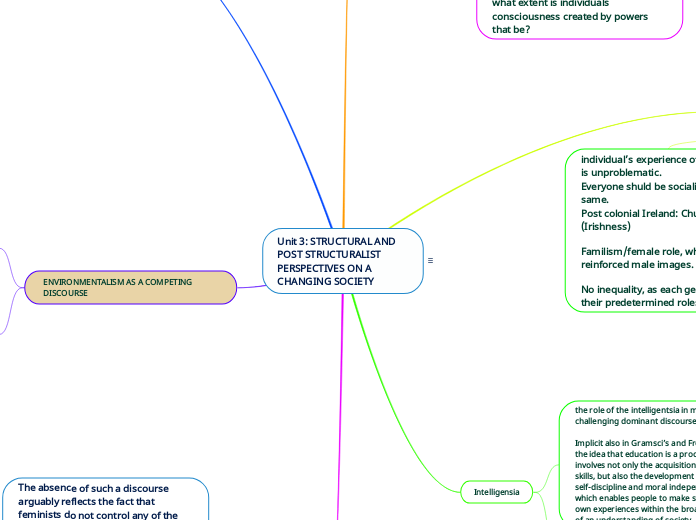Unit 3: STRUCTURAL AND POST STRUCTURALIST PERSPECTIVES ON A CHANGING SOCIETY
REVIEW
In this unit, we looked at functionalist, conflict and post-structuralist perspectives in the context of a changing society. Thus relatively little work has been concerned with the relationship between discourses and social structure-the relationship between the two being taken for granted in the functionalist perspective. Sociologists such as Lynch have been steadily concerned with this issue within the context of a conflict perspective. Work in a post structuralist perspective has tended to be more concerned with purely cultural phenomena although work such as Tovey’s has made an important contribution in this area of environment. My own work on gender (particularly 1995, 1998, 2000) has also wrestled with these issues.
Within the functionalist perspective the main focus is on the presentation of society as consensual. This view dominated not only academia, but also the wider society in Ireland up to the 1970s. In the 1970s and 1980s there was an increasing recognition of conflicting perspectives in Irish society. A key source of this conflict arose from the changing relationship between the institutional Roman Catholic Church and the State- much of this conflict revolving around the areas of the family and sexuality. In the 1990s the economic discourse became established as a dominant discourse –reflecting and reinforced by the economic boom that was dubbed the Celtic Tiger. Competing discourses in the shape of environmentalism and familism were identified- although the former has to some extent been co-opted and the latter has remained marginalised.
Finally, drawing on Gramsci’s ideas, we looked at the intelligentsia and speculated about its possible contribution to creating s hegemonic critique in a society where professionals make up 10% of those in the labour force-with roughly a half of these being women.
Feminist Discourse
emotional limitations of current concepts of masculinity and of the negative effects of homophobia
The absence of such a discourse arguably reflects the fact that feminists do not control any of the core institutional structures (e.g. the legal, political, administrative, economic systems etc).
there have been other episodic confrontations: contraception, occupational discrimination.
ENVIRONMENTALISM AS A COMPETING DISCOURSE
Tovey and Share (2007, 2012) have suggested that in Ireland discourses frequently reflect different views about what the countryside is for. Farming, building, etc.
Such populist discourses are likely to stress local control, and typically mount a challenge to specific developments (such as the building of pharmaceutical plant or a motorway development).
Post Structuralist Perspective
Foucault argued that one is never ‘outside power’, and that at the very least, we are all subject to the evaluations of others who apply standards of normality from particular discourses, rooted in a structural reality (and hence ultimately underpinned by power).
Economic discourse: The increasing importance of consumption as a leisure time activity and as a way of accessing cultural capital is obvious
O’Connell (2001, p.170) described as a ‘symmetrical transfer of trust from religion to business’ amongst the better off respondents.
Intelligensia
Siginificant increase as a result of economic modernisation’. Less interested in republicianism, rejection of violence, economically influenced.
the role of the intelligentsia in maintaining or challenging dominant discourses.
Implicit also in Gramsci’s and Freire’s views is the idea that education is a process which involves not only the acquisition of specific skills, but also the development of intellectual self-discipline and moral independence, and which enables people to make sense of their own experiences within the broader context of an understanding of society.
FUNCTIONALIST PERSPECTIVE
individual’s experience of social order is unproblematic.
Everyone shuld be socialised the same.
Post colonial Ireland: Church & state (Irishness)
Familism/female role, which reinforced male images.
No inequality, as each gender fulfilled their predetermined roles.
Case Study: Womeen in tourism in Ireland 90´s:
From functionist perspective, they were unaware of any gender misrepresentation in upper echelons: it did not arise
Conflict Perspective
Gramsci: Cohersive and consentual control: struggle between establishing hegemonic control, and the emergence of counter hegemonies.
Female case study: Conflict perspective could have also explained aquiesance: Consentual control? To what extent is individuals consciousness created by powers that be?
Hegemonic change, the cchurch. Eroded by contraception, divorce referendums, and abuse revelations.
From the point of view of conflict theorists, functionalist ‘explanations’ are highly suspect and are seen as reflecting a desire by those in power to perpetuate the status quo by obscuring the ‘subordinates’ interests (even from themselves), and socialising them into a cultural system which effectively copper fastens this denial.
important that individuals’ minds should be freed through a process of what he called hegemonic critique.

